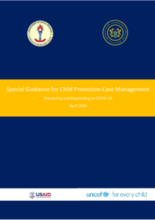Introduction
COVID-19 have disrupted the environments in which children grow and develop. Disruptions to families, friendships, daily routines and the wider community can have negative consequences for children’s well-being, development and protection. Measures used to prevent and control the spread of COVID19 by the Government of Ghana, including quarantine measures such as school closures and restrictions on movements, inversely disrupt children's routine and social support while also placing new stressors on parents and caregivers who may have to find new childcare options or forgo work. With added stress, school closures and restricted movement, children and caregivers may face increased social isolation, psychosocial distress and heightened domestic violence. Movement restrictions can also make it much harder for children or caregivers affected by violence to leave their household and seek help. Besides, stigma and discrimination related to COVID-19 may make children more vulnerable to violence and psychosocial distress. Children and families who are already vulnerable due to socioeconomic exclusion, have a history of violence in the home, or those who live in overcrowded settings are particularly at risk. For all of these reasons, the continuation of case management to very high-risk children and families is a fundamental part of emergency response and should be considered child lifesaving.
In this regard, the Department of Social Welfare is releasing this exceptional short guidance for government and NGO frontline workers, especially those who provide multi-sectoral case management services to most vulnerable children. This guidance should be read along with the Child Protection Case Management Standard Operating Procedures launched by the Department of Social Welfare of the Ministry of Gender, Children and Social Protection in 2019. This Guideline aims to further provide technical guidance to child protection workers to better respond to the child protection risks during a COVID-19 pandemic through case management, including psychosocial support.
This document has been adopted for use in Ghana from the guidance shared by the Alliance for Child Protection in Humanitarian Action and similar documents prepared in other countries.
For more information on COVID-19 and the impact on children and families in Ghana, visit https://www.unicef.org/ghana/covid-19

